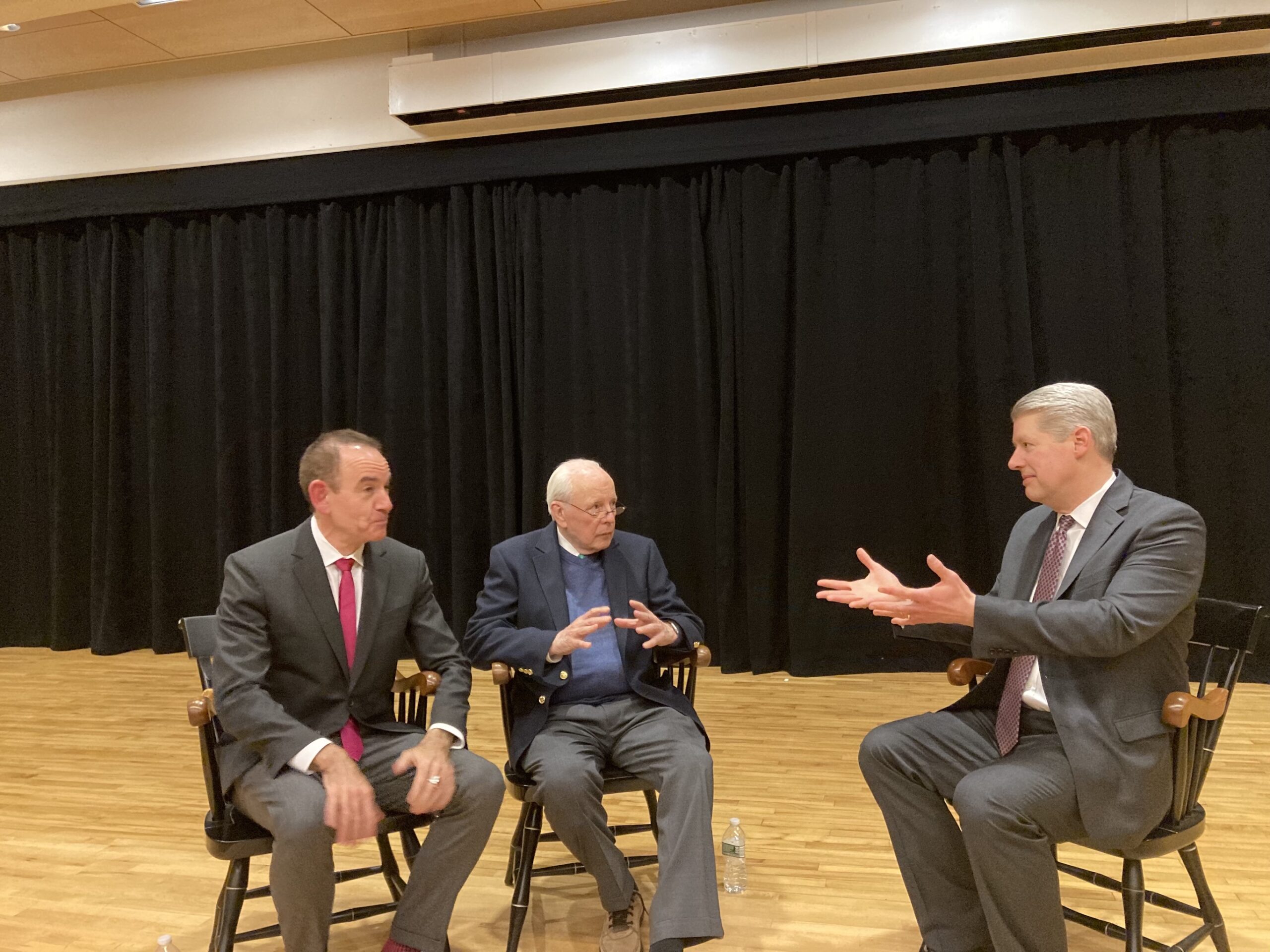Dean talks Watergate, fifty years on
May 5, 2023
 Sam Borne
Sam Borne“First, let me thank you for warning me we’re being taped, and we know where the machine and recording is,” Former White House Counsel to President Richard Nixon John Dean said.
Dean and Nixon historian Timothy Naftali discussed the Watergate Scandal and its greater impact on American government and society last night at Kresge Auditorium. The panel was moderated by Chair of the Department of Government and Legal Studies Andrew Rudalevige.
Watergate was an infamous political scandal in the United States during which Nixon ordered a break-in at the Democratic National Committee headquarters at the Watergate office complex in Washington, D.C. on June 17, 1972. The coverup that followed involved the abuse of presidential power and obstruction of justice, ultimately leading Nixon to resign due to fear of impeachment on August 9, 1974.
Dean served as a lawyer to Nixon during his presidency, and he destroyed evidence and paid hush money to participants in the Watergate break in. Dean later publicly testified before the Senate Select Committee on Presidential Campaign Activities, explaining how Nixon and officers had abused their roles to help cover up the break in. Dean’s testimony marked a pivotal turning point in the public’s understanding of the scandal and pushed for Nixon’s removal from office.
Naftali is the former director of the Nixon Presidential Library and Museum. During his tenure he created a factually-accurate Watergate exhibit for the museum, contrary to the wishes of some of the Nixon Foundation and family.
Rudalevige began the talk with an overview of the scandal, later transitioning into a discussion with Dean about his recollection of the events. Dean recounted a conversation where he began to understand that the scandal might bring down Nixon’s entire presidency.
“I started the conversation by saying, after some small talk, [that] there was a cancer on [Nixon’s] presidency. And after that, I did have his attention. Often when I talked to him, his feet were up on the desk and he’d be talking to me around his shoes,” Dean said. “I was never sure how close he was following, and after I told him there was a cancer on his presidency, both feet were on the ground.”
Dean later turned against Nixon and testified to the Senate about the president’s abuses of power.
“You were alone, at least you were defined as the challenger to the President of the United States,” Naftali said.
Yet, what Dean recalls from Watergate isn’t the burglary but rather the Nixon administrations’ disregard for the norms of government integrity.
“When I refer to Watergate, I’m thinking [of] something very different than most of you all … most people think of Watergate as a bungled burglary, and then a bumbling cover up. Watergate is a series of abuses of power that are triggered by the arrest at the Democratic National Committee. Watergate to me is a series of abuses of power and not just a bumbling burglary,” Dean said.
Naftali explained that the number of characters and complexity of the scandal made it difficult for the public to track and understand both what had happened and consequently how they should feel about it.
“I think for people who were actually watching it at the time, this was a very confusing Dickensian novel that seemed to be written by somebody on crack,” Naftali said.
Regardless, Watergate proved a pivotal turning point in American political history.
“But what makes this moment so important is that for the first time in American history, it looked like it was possible that an American presidential administration could collapse,” Naftali said.
Naftali explained that Nixon’s respect for the American presidency and form of government led him to resign from office instead of fighting Congress and the American public. Yet, Naftali fears that future presidents may not respect these institutions and place personal gain over the long term health and viability of the American government.
“Nixon respected the institution. He respected the fact that he wasn’t happy, in fact, he almost died as a result of this experience. But he respected the presidency … the idea that he would launch an insurrection or provoke violence, to stay in power, I don’t believe he ever thought of doing that,” Naftali said.“This is the key difference, all right, between what we just experienced in 2020 and what the nation experienced in 1974.”
David Treadwell ’64, who attended the talk, remarked that his key takeaway was the importance of integrity.
“The ultimate point is this is a country of laws. Nobody’s above the law and we [have] to keep that in mind,” Treadwell said.

Comments
Before submitting a comment, please review our comment policy. Some key points from the policy: